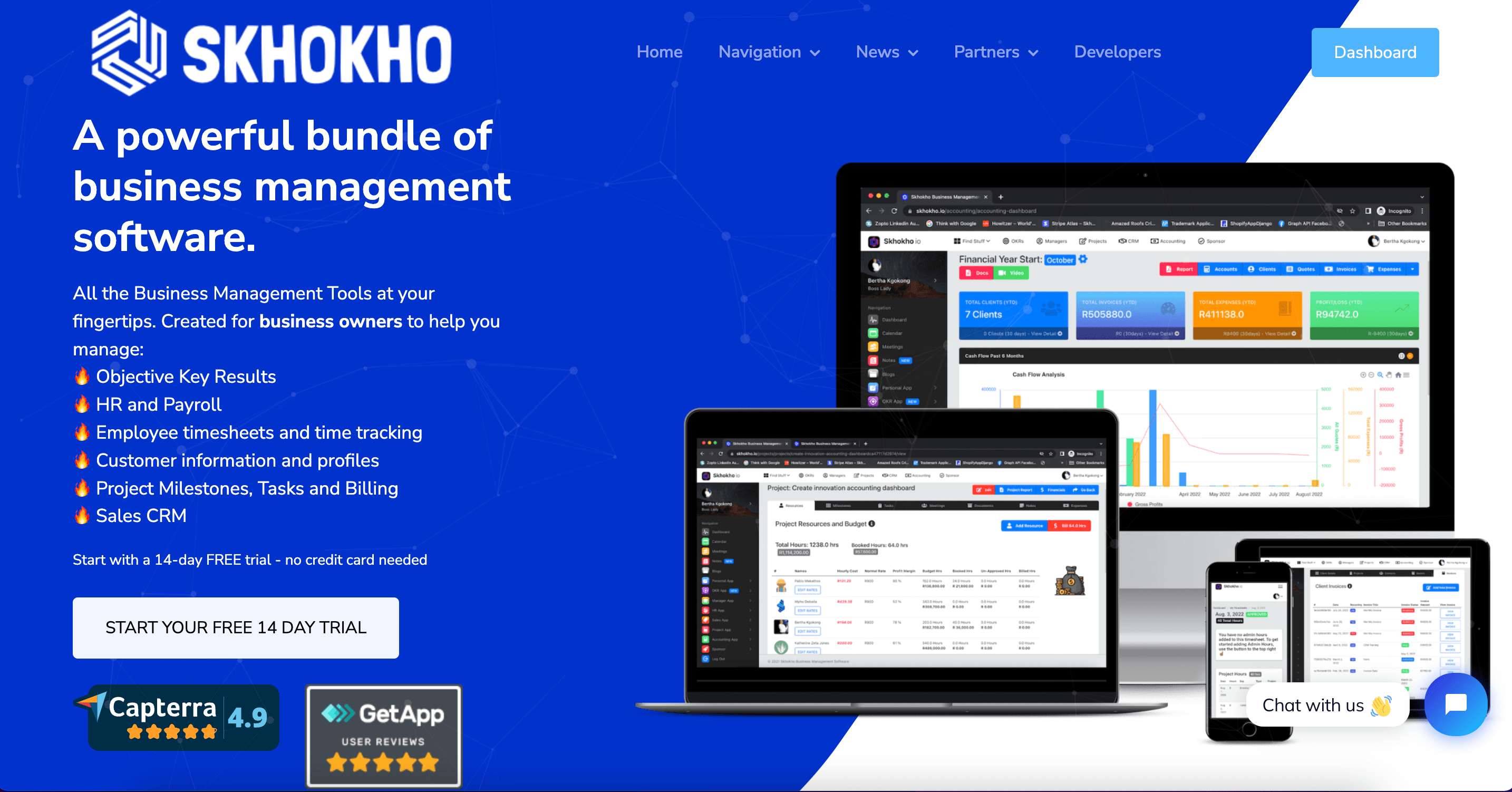How Business Management Softwares Support Scalability for Growing Businesses
Scalability is not just an option but a necessity for survival and success. As businesses expand, they encounter a variety of challenges that can hinder their growth and operational efficiency. This is where business management software steps in, providing the tools and insights needed to navigate the complexities of scaling effectively.
In this blog, we're diving deep into the world of business management software, with a special focus on how these platforms support the scalability of growing businesses. We'll also take an in-depth look at Skhokho, a business management system specifically designed for small to medium-sized startups, offering a comprehensive suite of tools tailored to the unique needs of expanding businesses.
Here's what we're going to cover:
- Growth Hacking: A Methodology for Business Scaling
- The Role of OKRs in Growth Hacking
- Introduction to Scalability Challenges
- The Role of Business Management Software in Addressing Scalability
- Key Features of Business Management Software That Support Scalability
- A Closer Look at Skhokho: Tailored for Scalability

Whether you're a startup on the brink of expansion or a growing business seeking to optimize your scalability strategies, this blog will provide you with valuable insights and actionable advice on leveraging business management software to achieve your growth objectives. Let's embark on this journey to scaling success together.
Growth Hacking: A Methodology for Business Scaling
Growth hacking has emerged as a pivotal methodology for startups and businesses focused on rapid growth and scalability. Unlike traditional marketing strategies that primarily aim for gradual growth, growth hacking combines creativity, analytical thinking, and social metrics to sell products and gain exposure. It's about leveraging data, technology, and innovative strategies to achieve significant growth in a short period. Within this ecosystem, Objective Key Results (OKRs) play a crucial role as a tool for implementing and measuring the success of growth hacking strategies. Let’s explore how growth hacking works as a methodology for scaling your business and how OKRs can be effectively used in this context.
Understanding Growth Hacking
Growth hacking is often characterized by a mix of marketing experiments, software development insights, and data analysis to identify the most effective, efficient ways to grow a business. This methodology is particularly popular among fast-moving startups and digital businesses looking to scale rapidly without the resources for a traditional marketing strategy. Key components of growth hacking include:
- A/B Testing: Running parallel strategies to see what works best.
- Viral Marketing: Creating shareable content to increase brand awareness.
- Product Development Hacks: Modifying the product based on feedback and usage patterns to better meet customer needs.
- Leveraging Analytics: Using data analytics to drive decisions and tailor strategies for maximum impact.
The Role of OKRs in Growth Hacking
Objective Key Results (OKRs) are a goal-setting framework that helps businesses define and track objectives and their outcomes. In the context of growth hacking, OKRs are invaluable for several reasons:
- Focus and Clarity: OKRs provide clear goals and measurable results, aligning the entire organization’s efforts towards growth. This focus is essential for rapid scaling, as it ensures that all resources are directed towards impactful activities.
- Agility and Adaptability: The iterative nature of OKRs, typically set and evaluated quarterly, allows businesses to be agile. They can quickly pivot or adjust strategies based on real-time feedback and market changes, a core principle of growth hacking.
- Measuring Success: OKRs offer a quantifiable way to measure the success of growth hacking experiments. By setting specific key results, businesses can directly correlate specific actions or strategies with growth outcomes, allowing for data-driven decision-making.
- Encouraging Innovation: By setting ambitious objectives, OKRs encourage teams to think creatively and experiment with new growth hacking techniques. This experimental mindset is key to discovering unique growth levers that can scale the business.
Implementing Skhokho OKRs for Growth Hacking

To leverage OKRs effectively in growth hacking, businesses should:
- Set Clear, Ambitious Objectives: Define what you aim to achieve in the context of growth. Objectives should be challenging yet achievable and align with your overall growth hacking strategy.
- Define Measurable Key Results: Key results should be quantifiable and directly related to the objective. They should provide a clear metric for success, such as user acquisition numbers, conversion rates, or revenue growth.
- Iterate and Learn: Use OKRs as a cycle of learning. After each period, review what worked and what didn’t. This iterative process supports continuous improvement and adaptation, key for successful growth hacking.
- Align and Communicate: Ensure that OKRs are communicated across the organization. Alignment ensures that everyone is working towards the same growth goals, fostering a cohesive and focused effort.
Implementing OKRs within Skhokho can be streamlined into a series of actionable steps, ensuring clarity and efficiency in achieving your business goals. Here's how you can set objectives, key results, track progress, and associate tasks with your OKRs in Skhokho:
Step 1: Set an Objective
- Navigate to the OKR App: From the menu, Select Objectives List from the dropdown list under the OKR App tab.
- Define Your Objective: Start by creating an objective that is measurable, concrete, and action-oriented. This should be a goal you aim to achieve over a set period, such as a quarter or a year. For example, "Increase company revenue by 30% in the next quarter".

Step 2: Add Key Results
- Identify Key Results: Once your objective is set, identify 2-3 key results that will serve as measurable outcomes demonstrating progress towards the objective. For instance, a key result for increasing revenue might be "Launch 2 new product offerings by the end of the quarter".

Step 3: Measure Key Results
- Update Progress: Skhokho allows you to track the progress of each key result. When there's progress to report, click on the button labeled "Update Metric" next to the respective key result. Here, you'll enter the current value (e.g., 1 new product launched) and provide a brief comment on the progress ("Launched 1 out of 2 planned products ahead of schedule"). This ensures that anyone reviewing the OKR can quickly understand the current status and any context relevant to the progress made. The update you made changes the progress bar of the key result and the entire OKR.

Step 4: Associate Tasks with OKRs
- Create Associated Tasks: To ensure that your objectives and key results translate into action, Skhokho enables you to add tasks directly linked to each OKR. Simply click on "New Task" within the objective section. A pop-up form will appear where you can detail the task, assign it to a team member, set a deadline, and describe any specifics about the task's execution. This ensures that each key result has a clear set of actions for which team members are responsible, helping to maintain focus and prevent missed deadlines.

By following these steps, businesses can utilize Skhokho to not only set strategic goals but also to ensure that these goals are actionable, measurable, and directly tied to the organization's daily operations. This structured approach to OKRs facilitates clear communication, accountability, and alignment across the team, driving forward the company's growth objectives with precision and efficiency.
Here are some useful video links for more detailed tutorials on OKR.
Objective Key Results OKRs Goal Setting Software SaaS
Skhokho OKR Software Dashboard Analytics and Report
Growth hacking is a powerful methodology for businesses aiming to scale rapidly. By combining innovative marketing strategies with the focused, measurable approach provided by OKRs, businesses can achieve significant growth. OKRs not only help in setting and tracking growth objectives but also foster a culture of agility and innovation, making them an indispensable tool for any growth hacking strategy.
Introduction to Scalability Challenges
In the journey of business growth, scalability is a critical milestone that marks the ability of an organization to expand without being hampered by its current structures or resources. It's a concept that encapsulates efficiency, adaptability, and sustained growth, even in the face of increasing demand or operational complexity. But what does scalability really mean for businesses, especially those in the throes of growth? And what are the common challenges they face in their quest to scale? Let’s delve into these questions to gain a clearer understanding.

Understanding Scalability
At its core, scalability refers to the capacity of a business to grow significantly and manage increased market demand without compromising on quality or performance. This can involve scaling up operations, resources, and systems in a way that the incremental cost of growth is lower than the incremental revenue growth. Scalability is not just about getting bigger; it's about being smarter and more efficient in how resources are utilized, how processes are optimized, and how technology is leveraged.
For a business to be scalable, it must possess a flexible operational framework that can adapt to changes quickly and efficiently. This includes having scalable business models, technology, infrastructure, and internal processes that can expand in alignment with the business’s growth objectives.
Common Scalability Challenges for Growing Businesses
- Resource Management: One of the primary challenges in scaling is managing resources efficiently. As businesses grow, their needs for human resources, technology, and capital increase. Balancing these needs without overspending or under-provisioning requires meticulous planning and management.
- Process Optimization: What works for a small team or a limited customer base may not hold up under the strain of growth. Processes that are not optimized for efficiency can become bottlenecks, leading to delays, increased costs, and customer dissatisfaction.
- Maintaining Quality and Consistency: As operations expand, maintaining the quality of products or services and ensuring consistent delivery can become challenging. This is often due to stretched resources, inadequate quality control systems, or the complexity of managing a larger operation.
- Technological Scalability: Technology that supports a business's operations must also scale. Legacy systems or platforms that cannot handle increased loads or integrate with new tools can severely limit a business’s ability to grow.
- Cultural and Organizational Changes: Scaling often requires changes in organizational structure and culture. Adapting to these changes while maintaining team cohesion and morale is a significant challenge for many growing businesses.
- Customer Experience and Satisfaction: Ensuring that the customer experience remains positive and that customer satisfaction levels are high is critical during scaling. Increased demand should not lead to a decline in the quality of customer service or support.
Addressing these challenges requires a strategic approach, where technology plays a pivotal role. Business management software, particularly those designed with scalability in mind, like Skhokho, offer growing businesses the tools and capabilities needed to navigate the complexities of scaling effectively. By automating processes, providing valuable insights, and streamlining operations, these software solutions help businesses overcome the hurdles of scalability and pave the way for sustainable growth.
The Role of Business Management Software in Addressing Scalability

The role of business management software in addressing scalability cannot be overstated, as it serves as the backbone for businesses aiming to grow efficiently and effectively. In the dynamic landscape of modern business, scalability challenges such as managing increased operational complexity, ensuring consistent quality and performance, and maintaining customer satisfaction are omnipresent. Business management software steps in as a crucial ally, offering an array of tools designed to streamline operations, automate repetitive tasks, and facilitate data-driven decision-making. By integrating various functions such as sales, finance, HR, and project management into a cohesive platform, these software solutions enable businesses to maintain a lean operational model while scaling, thereby ensuring that growth is not only achievable but sustainable.
Moreover, business management software enhances a company's ability to adapt and respond to changing market demands swiftly. Features like AI-powered analytics provide insights into performance metrics and customer behavior, allowing businesses to tailor their strategies for maximum impact. Comprehensive project management tools and efficient resource allocation capabilities ensure that projects are delivered on time and within budget, critical factors for maintaining competitiveness and customer satisfaction during periods of growth. In essence, business management software is indispensable for businesses seeking to navigate the complexities of scaling, providing a strategic advantage that facilitates smooth and successful expansion.
Key Features of Business Management Software That Support Scalability
Business management software is designed with a suite of features that specifically target the scalability needs of growing businesses. These features not only help in managing day-to-day operations more efficiently but also provide strategic insights that drive growth. Let’s delve into some of the key features that are crucial for supporting scalability.
- Efficiency in Document Creation
- Centralized Planning and Tracking and Collaboration Tools
- Resource Allocation and Scheduling, Timesheet and Attendance Management
- Customer Data Management and Sales Pipeline Management
- Financial Management and Reporting, Expense Tracking and Management

A Closer Look at Skhokhos' Functionalities: Tailored for Scalability
Skhokho stands as a comprehensive business management system that's specifically crafted to support the scalability of small to medium-sized startups. Its suite of features is designed not just to manage the day-to-day operations of a growing business but to actively support and enable its growth. Each feature of Skhokho addresses a crucial aspect of business management, ensuring that businesses can scale efficiently and effectively. Let's delve deeper into how Skhokho's features are tailored for scalability.
→AI-Powered Documents: Crafting Important Documents: Skhokho leverages AI to assist in creating vital documents. This includes everything from business plans to financial reports and marketing materials. By using AI, Skhokho helps reduce the time and effort involved in document creation, ensuring that businesses can produce high-quality documents quickly. This capability is invaluable for scaling businesses that need to adapt and respond rapidly to market changes.
→Objective Key Results (OKRs): Strategic Alignment and Growth: The OKR feature in Skhokho enables businesses to set, track, and achieve their objectives and key results. This framework helps align the team's efforts towards common goals, ensuring that everyone is focused on activities that drive growth. It's an essential tool for scalability, as it helps businesses maintain clarity and direction amid the complexities of expansion.
→HR and Payroll Management: Simplification and Compliance: Skhokho simplifies HR processes and payroll management, automating tasks to ensure compliance with legal requirements and enhancing employee satisfaction. This automation allows businesses to scale their workforce efficiently, managing more employees without significantly increasing the burden on HR personnel.

→Employee Timesheets and Time Tracking: Boosting Productivity and Accountability: By enabling precise tracking of employee hours and activities, Skhokho enhances productivity and accountability within the team. This feature is crucial for identifying inefficiencies and optimizing workflows, which are key for scaling businesses that need to maximize the output of their growing teams.
→Customer Information and Profiles: Enhancing Sales and Marketing: Keeping detailed track of customer information is vital for tailoring sales and marketing strategies. Skhokho provides tools to manage customer profiles effectively, enabling personalized engagement and better understanding of customer needs. This insight is invaluable for scaling businesses looking to increase customer acquisition and retention.
→Project Milestones, Tasks, and Billing: Project Delivery and Financial Control: Skhokho’s project management features ensure that projects stay on track and within budget. By managing milestones, tasks, and billing efficiently, businesses can improve project delivery and client satisfaction. This aspect of Skhokho supports scalable operations by enabling businesses to handle more complex, larger-scale projects effectively.
→Sales CRM, Lead Management, Email Marketing: Optimizing the Sales Process: The integrated sales CRM, lead management, and email marketing tools in Skhokho streamline the entire sales process. From lead acquisition to conversion, these tools enhance customer engagement and optimize sales strategies, supporting scalable growth by ensuring that sales efforts are both effective and efficient.
→Accounting App: Financial Management Simplification: Financial management is simplified with Skhokho’s accounting app, which supports everything from invoicing to financial reporting. This feature ensures accuracy and compliance, providing businesses with a clear view of their financial health as they scale. Effective financial management is critical for sustainable growth, making this feature a cornerstone of Skhokho's scalability support.
Skhokho at Your Service!
Implementing a business management system like Skhokho represents a significant step forward for small to medium-sized startups focusing on scalability. By integrating this comprehensive platform, businesses can streamline operations, enhance efficiency, and make data-driven decisions that propel growth.

To take advantage of your 14 day free trial on Skhokho OKRs, click here to Register an Account. Do not worry about finding your way on the system, Skhokho provides Documentation Guide and YouTube Tutorials to help you find your way.









